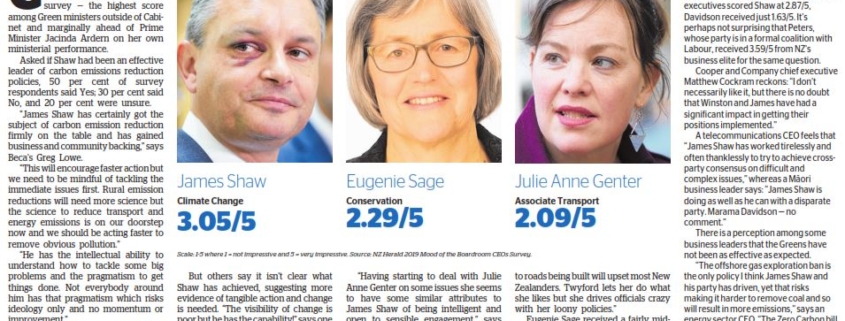http://bit.ly/2kNoFwg
Climate Change Minister James Shaw was rated at 3.05/5 by chief executives in the Herald survey — the highest score among Green ministers outside of Cabinet and marginally ahead of Prime Minister Jacinda Ardern on her own ministerial performance.
Asked if Shaw had been an effective leader of carbon emissions reduction policies, 50 per cent of survey respondents said Yes; 30 per cent said No, and 20 per cent were unsure.
“James Shaw has certainly got the subject of carbon emission reduction firmly on the table and has gained business and community backing,” says Beca’s Greg Lowe.
“This will encourage faster action but we need to be mindful of tackling the immediate issues first. Rural emission reductions will need more science but the science to reduce transport and energy emissions is on our doorstep now and we should be acting faster to remove obvious pollution.”
“He has the intellectual ability to understand how to tackle some big problems and the pragmatism to get things done. Not everybody around him has that pragmatism which risks ideology only and no momentum or improvement.”
Many believe Shaw has been particularly effective in getting business on board with Green policies. “The Green Ministers — particularly James Shaw — have surprised many in the business community for their ability to listen,” says a leading banking boss.
Z Energy chief executive Mike Bennetts says “James has been very effective in managing conflicting views to an overall consensus that is acceptable to all stakeholders”. Adds an automotive firm chief executive, “Thank goodness James Shaw is there, otherwise nothing would be happening”.
But others say it isn’t clear what Shaw has achieved, suggesting more evidence of tangible action and change is needed. “The visibility of change is poor but he has the capability!” says one respondent.
The head of an investment firm reckons “Shaw has been a highly effective co-leader for a small party outside of government, and on key issues.”
Adrienne Young-Cooper, chair of Panuku Development Auckland, offers him some advice: “he needs to lose the suit and be really innovative in addressing a lighter more loving footprint on our beautiful so damaged planet”.
Shaw’s colleague Julie Anne Genter who holds the women’s portfolio and is Associate Health and Transport Minister was scored at 2.09/5.
“Having starting to deal with Julie Anne Genter on some issues she seems to have some similar attributes to James Shaw of being intelligent and open to sensible engagement,” says Deloitte’s Thomas Pippos.
Others are more critical — Simplicity’s Sam Stubbs says she seems “hard wired to hate cars and love trains”:
“Her passion, and the Governments need for the Greens, could commit the nation to extremely expensive spending on a transport technology better suited to more population dense countries, and last century, not this one.”
Adds another: “Genter represents the greatest risk to this Government. She has let power go to her head, and her anti-car campaigns and opposition to roads being built will upset most New Zealanders. Twyford lets her do what she likes but she drives officials crazy with her loony policies.”
Eugenie Sage received a fairly middling grade of 2.29/5 for her work as Conservation Minister and Land Information.
She received just a single comment — the partner of a major legal firm says her role in the OIO approval process has been underwhelming. “There is a lot of uncertainty in the business community as now ministerial decisions seem to be going against the Overseas Investment Office’s technical recommendations for political or party reasons rather than following a considerate investment assessment”.
Influencing power
When it comes to their ability to influence policy outcomes, Greens co-leaders James Shaw and Marama Davidson rate well behind that political pro, NZ First leader Winston Peters. Asked to rate the party’s co-leaders on this issue — on a scale where 1 = not impressive and 5 = very impressive, chief executives scored Shaw at 2.87/5, Davidson received just 1.63/5. It’s perhaps not surprising that Peters, whose party is in a formal coalition with Labour, received 3.59/5 from NZ’s business elite for the same question.
Cooper and Company chief executive Matthew Cockram reckons: “I don’t necessarily like it, but there is no doubt that Winston and James have had a significant impact in getting their positions implemented.”
A telecommunications CEO feels that “James Shaw has worked tirelessly and often thanklessly to try to achieve cross-party consensus on difficult and complex issues,” whereas a Māori business leader says: “James Shaw is doing as well as he can with a disparate party. Marama Davidson — no comment.”
There is a perception among some business leaders that the Greens have not been as effective as expected.
“The offshore gas exploration ban is the only policy I think James Shaw and his party has driven, yet that risks making it harder to remove coal and so will result in more emissions,” says an energy sector CEO. “The Zero Carbon bill hasn’t gone anywhere yet and policies to make it real seem a long way off.”
In contrast, a real estate boss says the Greens have made an impact: “if you look carefully, the Greens have had wins on almost every one of their major policy platforms”.
At the recent Green party AGM, Shaw highlighted a string of achievements — including the ban on new fossil fuel exploration, public transport initiatives and the $100m Green Investment Fund.
“This year’s budget alone contained $6 billion in new funding for Green Party initiatives,” he said




Leave a Reply
Want to join the discussion?Feel free to contribute!